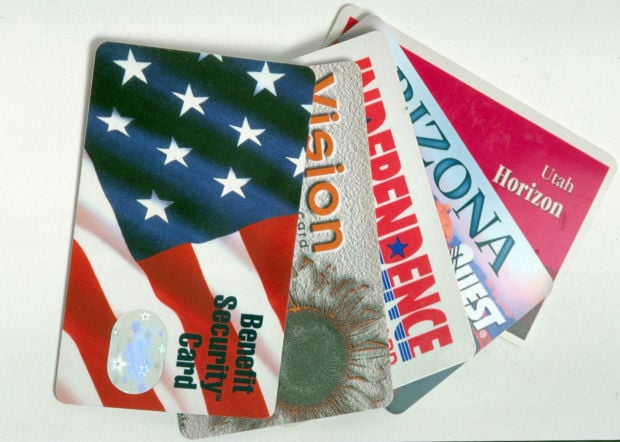Food stamps
Facing a wall of opposition, a proponent of welfare reform gave up Tuesday on his bid to remove food stamp benefits from 120,000 Arizonans.
As approved, HB 2596 would allow the state to provide only the benefits absolutely required by federal law in the Supplemental Nutrition Assistance Program. It specifically prohibits state officials from taking advantage of provisions in federal law that allow states to expand eligibility or waive certain requirements — at federal expense — for certain groups.
For example, one waiver forgives the requirement to work in counties where the unemployment rate is higher than 10 percent on the premise that there are not jobs to be had.
But Rep. Justin Olson, R-Mesa, said that eliminating waivers and other exceptions would encourage more people to work.
That drew outrage from foes.
State Rep. Charlene Fernandez, D-Yuma, said the lost eligibility for food stamps would end the automatic qualification of children for the free and reduced-price lunches. “This bill takes away a warm meal for 18,000 kids,” she said.
And Rep. Lela Alston, D-Phoenix, scoffed at the idea that taking away benefits will get people into jobs.
“This is the first time I have ever heard of the economic theory that the path to prosperity and self-reliance and well-being and money was achieved through starvation,” she said.
Only as the measure was headed to defeat did Olson agree to remove the language that left him short of the 31 votes needed for approval. Several Republicans then changed their votes, allowing the measure to be approved on a 33-26 margin.
If Olson lives up to that commitment, that would leave in HB 2596 only what he said are anti-fraud protections, including putting the photo of recipients on their electronic benefit transfer cards.
Sober living homes
On a 49-9 vote the House agreed Tuesday to let communities regulate group homes designed to help people with drug and alcohol problems.
Rep. Noel Campbell, R-Prescott, said the homes have become a particular problem in his city, with 156 at last count.
“And when you figure eight to a house, minimum, at any one time you have 1,400 to 1,500 young men walking around downtown Prescott,” he said.
“These are drug abusers,” Campbell continued, saying there’s a “clash of cultures” with the residents, “especially when these homes pop up in an older, single-family neighborhood.”
He acknowledged that cities cannot keep out such facilities that are protected by federal laws. But Campbell said HB 2107 provides oversight to ensure that actual treatment is being provided.
That includes mandatory registration — including the name of the property owner, minimum square-footage requirements for residents and supervision requirements — and requires that facilities have discharge plans, including what happens to those who do not comply with house rules.
Campbell’s legislation would have no effect on homes already licensed by the state Department of Health Services. And he conceded the measure would not necessarily solve what he said is a concentration of these group homes in certain neighborhoods.
“The ones that are grandfathered in, they can stay there,” he said. But he said homes that do not register and meet the requirements can be declared a “nuisance” and closed.
In getting the measure approved, Campbell told lawmakers they should not think of this as solely a Prescott issue.
“This is a problem that’s going to come to your neighborhood sooner or later,” he said.
Gun rights
Without debate the state House voted to try to restrict the rights of Arizonans to propose new restrictions on the sale and transfer of firearms.
HB 2524 requires the state to try to enter into binding agreements with other states, each one agreeing not to allow any additional laws. That would cover not only what the Legislature could enact but would effectively override the constitutional right of initiative, at least on the subject of weapons.
Rep. Bob Thorpe, R-Flagstaff, admitted the measure is aimed at initiative drives being promoted by former New York City Mayor Michael Bloomberg. He is supporting efforts to require background checks any time a weapon is sold.
Current federal law applies that requirement only when a gun is sold by a licensed firearm dealer. Thorpe said he opposes measures that would impose the same mandate on person-to-person transfers, including weapons sold at gun shows.
The 35-24 vote sends the measure to the Senate.
Initiative overrides
The House voted to ask voters to let them override what is approved at the ballot.
HCR 2043 would void a constitutional provision, itself approved by voters in 1998, that says once a measure is enacted by voters it can be amended by the Legislature only on a three-fourths vote. It also cannot be repealed, as changes are permissible only if they “further the purpose” of the original ballot measure.
In its place would be permission for lawmakers to make alterations or repeal outright, as long as it was by the same margin that voters enacted the original measure.
A final House vote will send that to the Senate. But even if it gets approved there, the change would have to be ratified by voters in November.
Tax credits
Teachers could deduct up to $200 a year in what they owe in state income taxes under the terms of legislation approved Tuesday by the House.
HB 2151 would provide a dollar-for-dollar credit for anything spent by teachers for school supplies. Proponents said it would at least provide partial compensation for those who already are dipping into their own wallets.
The 34-24 vote sends the measure to the Senate.
Capitol Media Services





